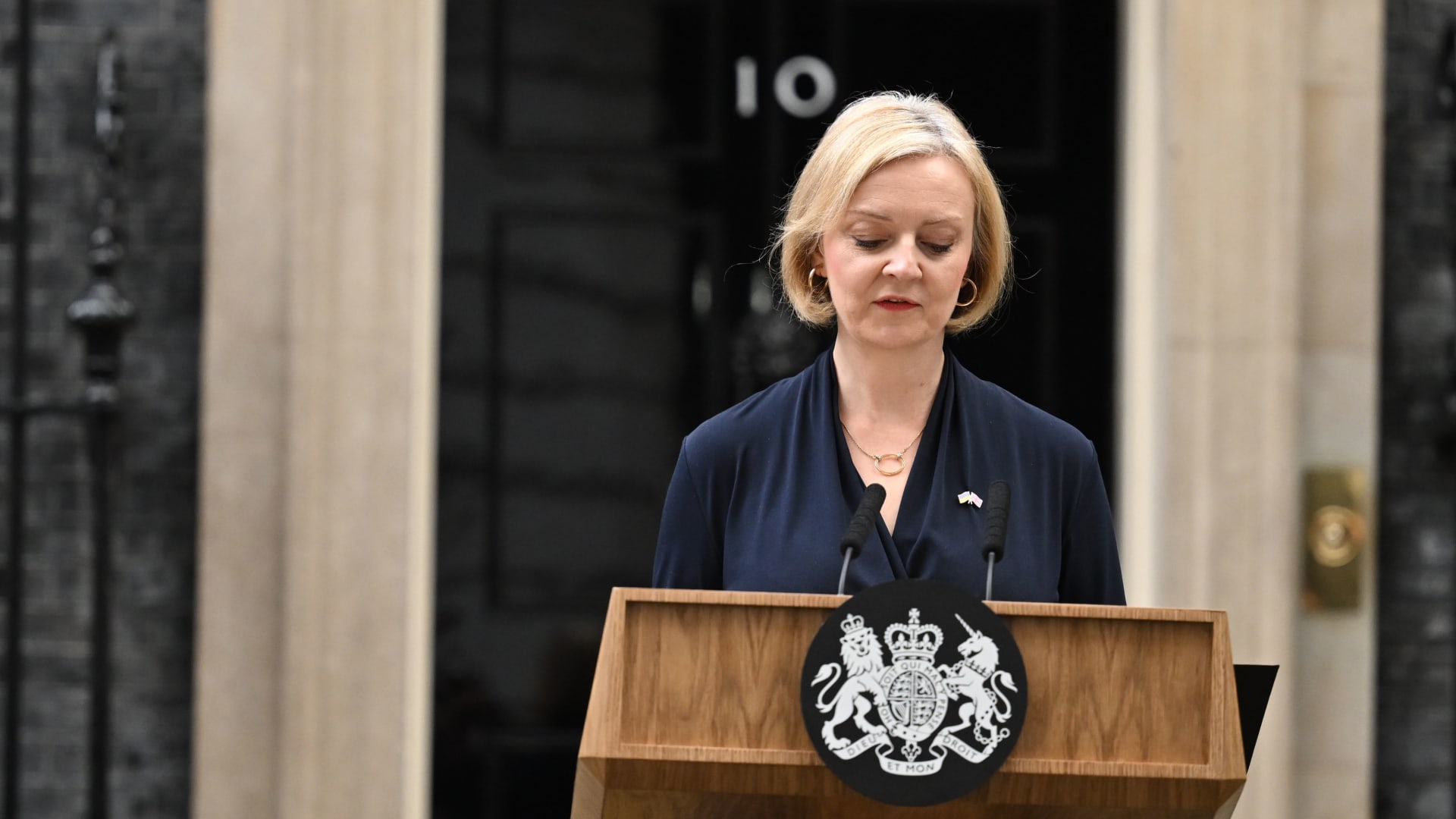UK Prime Minister Liz Truss resigns after failed budget and market turmoil

Prime Minister Liz Truss announces her resignation at 10 Downing Street on October 20, 2022 in London, England.
Leon Neal | Getty Images
LONDON — U.K. Prime Minister Liz Truss resigned Thursday following a failed tax-cutting budget that rocked financial markets and which led to a revolt within her own Conservative Party.
Truss was in office for just 44 days, making her the shortest-serving prime minister in British history. For 10 days of her premiership government business was paused following the death of Queen Elizabeth II.
She said in a statement outside Downing Street, “We set out a vision for a low-tax, high-growth economy that would take advantage of the freedoms of Brexit.”
“I recognize though, given the situation, I cannot deliver the mandate on which I was elected by the Conservative Party. I have therefore spoken to His Majesty the King to announce that I am resigning as leader of the Conservative Party.”
The party is now due to complete a leadership election within the next week, much faster than this summer’s two-month period. Graham Brady, the Conservative politician who is in charge of leadership votes and reshuffles, told reporters he was now looking at how the vote could include Conservative MPs and the wider party members.
Her resignation came after a meeting with Brady, who chairs the 1922 Committee — the group of Conservative MPs without ministerial positions who can submit letters of no confidence in the prime minister. Just before the meeting, a Downing Street spokesperson told reporters Truss wanted to stay in office.
During the hour the meeting lasted, the number of MPs publicly calling for Truss to step down reached 17. The number who had written letters to Brady expressing no confidence in the prime minister was reported to be more than 100 by Thursday.
The pound was up 1% on the day against the dollar at 3:00 p.m., trading at $1.1214. It remains at the level it was on Sept. 22, before Truss’ market-moving budget. The yields on 30-year, 10-year and five-year gilts (U.K. sovereign bonds) were all lower after Truss’ brief speech.
Loading chart…
Opposition parties Labour, the Scottish National Party and the Liberal Democrats called for an immediate general election on Thursday afternoon. Labour leader Keir Starmer said, “The Conservative Party has shown it no longer has a mandate to govern.”
Controversial ‘mini-budget’
On Sept. 23, Truss’ finance minister, Kwasi Kwarteng, announced a so-called mini-budget which began a turbulent period for U.K. bond markets which balked at the debt-funded tax cuts he put forward. Most of the policies were reversed three weeks later by the second finance minister, Jeremy Hunt.
Truss beat Rishi Sunak to become leader of the Conservative Party following the resignation of Boris Johnson on July 7. Sunak is now one of the favorites to succeed Truss, along with Hunt, another leadership contender Penny Mordaunt, Defense Minister Ben Wallace and former Prime Minister Boris Johnson.
The resignation leaves the status of the Conservatives’ expected budget update on Oct. 31 uncertain, but Truss said the leadership handover would “ensure we remain on a path to deliver our fiscal plans.”
In her statement, Truss suggested the legacies of her brief tenure were supporting households with energy bills and cutting the rate of national insurance, a general taxation in Britain. The cut was one of very few measures of the “mini budget” to remain; while the energy support package, which was initially set to run for two years, was cut to six months.
She also said the U.K. had “continued to stand with Ukraine and to protect our own security.”
U.S. President Joe Biden said in response to the news: “The United States and the United Kingdom are strong Allies and enduring friends — and that fact will never change.”
“I thank Prime Minister Liz Truss for her partnership on a range of issues including holding Russia accountable for its war against Ukraine … We will continue our close cooperation with the U.K. government as we work together to meet the global challenges our nations face.”
Regaining trust
Paul Dales, chief U.K. economist at Capital Economics, said the new PM would need to do more to regain the trust of financial markets.
“In just a few weeks fiscal policy has swung from being ultra loose, to less loose to outright tight,” he said in a note.
“Overall, the resignation of Truss is a step that needed to happen for the UK government to move further along the path towards restoring credibility in the eyes of the financial markets. But more needs to be done and the new Prime Minister and their Chancellor have a big task to navigate the economy through the cost of living crisis, cost of borrowing crisis and the cost of credibility crisis.”
Think tank Pantheon Macroeconomics said in a report on the U.K. Thursday: “A drawn-out recession lies ahead, now that overseas investors have lost faith in policymakers, forcing the [Monetary Policy Committee] to hike Bank Rate quickly and the government to tighten fiscal policy.”
The U.K. economy was already weakening before the “calamitous” mini-budget, the authors wrote. Looking forward, the nation faces a likely pullback in consumer spending, squeeze in households’ disposable incomes, lower employment, and higher interest rates “snuffing out” recovery in business investment, Pantheon added.









